|
Related FAQs: Indonesian Butterflies, Butterflyfish Identification, Butterflyfish
Foods/Feeding/Nutrition, Butterflyfish Compatibility, Butterflyfish Behavior, Butterflyfish Systems, Butterflyfish Selection, Butterflyfish Disease, Butterflyfish
Reproduction,
Over to other Regional
Accounts of Butterflyfishes: Hawai'i, Cooks, Red
Sea, Maldives,
Related Articles: Butterflyfishes,
/Fishwatcher's Guide
Series
Butterflyfishes of
Indonesia
|
|
| Bob Fenner |
|
 |
Butterflyfishes for Marine
Aquariums
Diversity, Selection & Care
New eBook on Amazon: Available
here
New Print Book on Create Space: Available
here
by Robert (Bob) Fenner |
Genus Chaetodon:
|
Chaetodon adiergastos
Seale 1910, the Panda Butterflyfish. Far west tropical Pacific in
distribution. A coral polyp plus other invertebrate feeder. To
six inches total length. This one in Pulau Redang,
Malaysia.
|

|
| Chaetodon assarius Waite
1905, the West Australian Butterflyfish. A rare beauty outside the
Land Down Under, where it's found all along the west coast.
Generalized feeder on algae and zooplankton. To five inches total
length. |
No photo (yet!)
|
| Chaetodon
aureofasciatus Macleav 1878, the Golden-Striped
Butterflyfish. From all along Australia's northern coast over
to New Guinea. Another coral polyp feeder. Images from off of
Queensland in Australia. Go visit it there. Below; one, two and
five (maximum size) individuals. |
| Chaetodon
auriga Forsskal 1775, the Threadfin Butterflyfish. A
great beauty and hardy aquarium specimen, though it will eat coral
polyps and anemones. See other materials on this species by
clicking on name. Widespread Indo-Pacific. A juvenile (about an
inch and a half long) in N. Sulawesi, an Auriga B/F in Hawai'i,
and a Red Sea one w/o the rear dorsal area
eyespot. |
|
Chaetodon baronessa Cuvier
1831, the Eastern Triangular or Baroness Butterflyfish. Like the
similar Indian Ocean congener, Chaetodon triangulum, this
fish is a strict feeder on coral polyps. Too often shipped out of
Fiji, the Philippines and Indonesia. To six inches in the
wild.
|
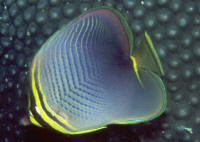
|
|
Chaetodon
bennetti Cuvier 1831, Bennett's Butterflyfish.
Central Pacific to Africa's east coast. To about six inches
total length. Most all food consists of coral polyps. Juvenile
and adult coloration in specimens in the Cook Islands and Fiji
shown.
|
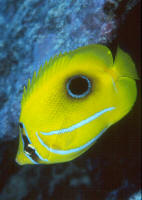 
|
| Chaetodon (Roaops)
burgessi Allen & Starck 1973, Burgess'
Butterflyfish. Deepwater in Philippines, Sipadan, Australia, New
Guinea. Not a great beauty, but much better than the aquarium photo
here. To five inches long. Photo by H RMF of one in an
aquarium. |

|
| Chaetodon citrinellus
Cuvier 1831, the Speckled Butterflyfish. Aggressive in the wild,
this is another broad feeder of invertebrates, including corals.
Widely distributed and common, though never plentiful in the
mid-Pacific all the way over to Africa. To five inches overall. A
juvenile in Hawaii and adult in the Cooks |
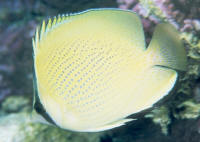
|
|
Chaetodon collare Bloch
1787, the Pakistani, Red-Tail or Collare Butterflyfish. Along the
continental coast of the Indian Ocean Oman to the Philippines in
distribution. A delicate looking species that fares well in
general. Best shown and kept in pairs to groups. Image made in
the Andaman Sea off of Thailand.
|
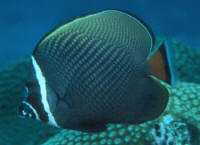
|
| Chaetodon decussatus,
Cuvier 1831, Indian (Ocean) Vagabond Butterflyfish. A
hardy beauty not to be confused with its congener loser from the
wider Indo-Pacific, the Vagabond Butterflyfish, Chaetodon
vagabundus which rarely lives (see below). An Indian Vagabond juvenile in captivity, an intermediate in
the Andaman Sea and an adult in N. Sulawesi. |
|
Chaetodon ephippium Cuvier
1831, the Saddleback Butterflyfish. To a large size (9") and
too often collected too large for aquarium use (get one 3-4"
best). Central and western Pacific. Very nice out of Hawai'i
for use in the U.S. Broad feeder on benthic invertebrates
including coral polyps. Aquarium, Fiji, and N. Sulawesi
images.
|
|
Chaetodon falcula Bloch
1793, Saddle-Back or Falcula Butterflyfish. A hardy
addition to fish only and very large reef systems (to 8 inches
long) if you can acquire initially undamaged specimens. Indian
Ocean from Andaman Sea to east coast of Africa. This one in the
Andaman Sea.
|
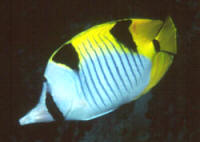
|
| Chaetodon guentheri Ahl
1913, Gunther's Butterflyfish. Found along the Wallace Line,
from southern Japan to eastern Australia. To five inches
long. Aquarium image. |

|
| Chaetodon
guttatissimus Bennett 1832, the Spotted Butterflyfish. Some
folks rate this species higher for aquarium use, but it takes a
beating often in transit, especially its small mouth. Tropical
Indian Ocean. To five inches long. Generalized feeder on
invertebrates (including coral polyps), and algae. A juvenile and
adult in the Maldives. |
 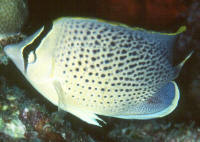
|
|
Chaetodon kleini Bloch
1790, Klein's Butterflyfish. Widespread from Hawai'i over
to Africa's east coast. To five inches overall. A hardy, but
shy species that often perishes due to too much commotion and
competition in captivity. Below: A juvenile and adult in
Hawai'i, an adult one Redang, Malaysia.
|
|
Chaetodon lineolatus Cuvier
1831, the Lined Butterflyfish. At a foot long, vying for largest
Butterflyfish of the family. Widespread from Hawai'i over to
the east coast of Africa, into the Red Sea. A beauty that eats
corals, anemones, much of all else, but doesn't live. Below:
One in Hawai'i, another in Fiji, and a third in the Red
Sea.
|
|
Chaetodon
lunula (Lacepede 1803), the Raccoon Butterflyfish.
Though not as attractive as its namesake in the Red Sea (C.
fasciatus), the Indo-Pacific Raccoon is just as hardy,
and a very good choice for eating pest Aiptasia anemones in reef
tanks, though it will consume coral polyps in some cases. Click
on name for more information, images. This one in the Cook
Islands, South Pacific.
|

|
| Chaetodon lunulatus Quoy
& Gaimard 1824, the Redfin Butterflyfish. Easily confused with
the Indian Ocean Redfin Butterflyfish, Chaetodon
trifasciatus, this western Pacific to Hawaii congener fares no
better in captivity. To about six inches long in the wild... leave
it there. Here's a specimen in Fiji. |

|
|
Chaetodon
melannotus Bloch & Schneider
1801, the Black-Backed Butterflyfish. To six inches, mainly
3-4. Widespread distribution from Africa's east coast and Red
Sea (pictured here) over to the mid-Pacific. Hardy, though it
does eat soft and hard coral polyps. Red Sea images, 2 and
4" specimens.
|
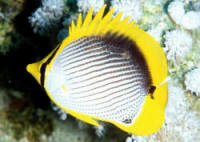 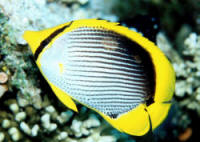
|
| Chaetodon
meyeri Bloch & Schneider 1801, Meyer's Butterflyfish.
Widespread in the Indian Ocean to western Pacific Oceans, this
species is another loser that is too-frequently sold as a
"miscellaneous" butterfly. Only eats coral polyps... In
the Maldives and N. Sulawesi. |
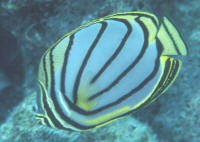 
|
| Chaetodon ocellicaudus
Cuvier 1831, the Spot-Tail Butterflyfish. A look-alike species for
the more commonly offered Black-Backed B/F, C. melannotus.
Similar in habits, hardiness. Centered in the other's
distribution in the far western Pacific. This one off of Pulau
Redang, Malaysia. |

|
| Chaetodon octofasciatus
Bloch 1787, the Eight-banded Butterflyfish. Often sold as a
"misc." butterfly, this is a strict feeder on coral
polyps... rarely lives more than a few days. A juvenile in Pulau
Redang, Malaysia, a semi-adult in captivity and a more typical
yellowish one in N. Sulawesi. |
|
Chaetodon ornatissimus Cuvier 1831, the
Ornate Butterflyfish. Yet another obligate corallivore. Yes, a
beauty, but does not live in home fish tanks. Indo-west Pacific,
Including Hawaiian Islands. To about seven inches in length.
Commonly offered, doesn't live. Adult in Hawai'i by
RMF.
|
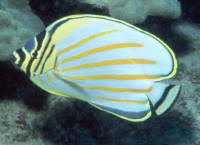
|
| Chaetodon oxycephalus Bleeker 1853, the
Spot-Nape or Pig-Face Butterflyfish. Like the very similar and
commonly (mis)offered Lined B/F, C. lineatus, this is a very
large, poor-surviving species in captivity. Indo-west distribution
from the Maldives to Palau. To ten inches. |
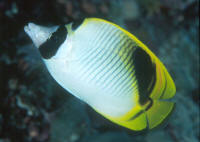
|
| Chaetodon rafflesi Bennett
1830, the Latticed or Raffles' Butterflyfish. Indo-west Pacific
from eastern India to the Tuamotus. Omnivore that does eat anemones
and coral polyps. To six inches total length. Here in
Fiji. |
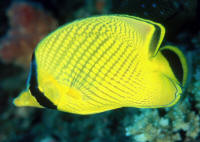
|
|
Chaetodon reticulatus Cuvier 1831, the
Reticulated Butterflyfish. Nice looking, and "friendly"
underwater toward divers, but dismal survival records in
captivity for this coral polyp eater. Found commonly in central
and western Pacific. To six inches total length. One in the
Cooks, another in N. Sulawesi.
|
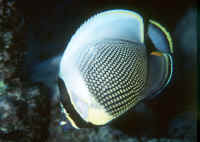 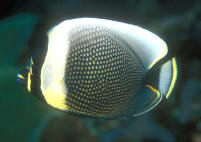
|
| Chaetodon selene Bleeker 1853, the
Yellow-dotted Butterflyfish. Western Pacific; Philippines, New
Guinea, Indonesia... To 16 cm. Found near steep drop-offs.
Generally in pairs as adults, single juveniles. Feed on benthic
invertebrates. N. Sulawesi photo of an adult. |
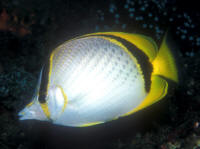
|
| Chaetodon semeion Bleeker 1855, the Dotted
Butterflyfish. A touchy species that is occasionally imported into
the West... found in the Indo-west Pacific from Sri Lanka to the
Tuamotus of French Polynesia. This adult in northern
Indonesia. |
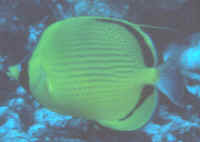
|
|
Chaetodon speculum Cuvier 1831, the Mirror
or Oval-Spot Butterflyfish. A shy species that lives in coral
rich areas where it feeds on same and other benthic
invertebrates. To some seven inches in length. Eastern Indian
Ocean to western Pacific. Ones off of Bunaken, Sulawesi,
Indonesia.
|
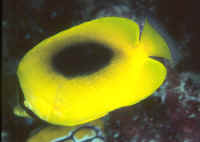 
|
|
Chaetodon
trifascialis Quoy & Gaimard 1824,
Chevron Butterflyfish. This fish is way too often offered in the
trade, belying it's wide distribution, mid-Pacific to the
east coast of Africa and the Red Sea. Almost exclusively lives on
eating Acroporid polyps. To seven inches in length. One in the
Red Sea, another two during the day and night in Fiji.
|
| Chaetodon
trifasciatus Park 1797, the Melon or Indian Ocean Redfin
Butterflyfish. Like the same named Redfin Butterflyfish from the
Pacific this is primarily a coral polyp feeder. Note the I.O.
species much bluer dorsal coloration To about six inches long in
the wild. Two Indian Ocean Butterflyfish, the first one in the
Seychelles, the other the Maldives |
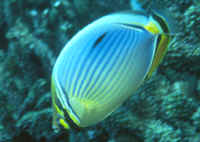 
|
|
Chaetodon ulietensis Cuvier 1831, the
Pacific Double Saddleback Butterflyfish. A Pacific version of the
Falcula or Saddleback Butterflyfish (Chaetodon falcula) of
the Indian Ocean. Omnivorous eating habits, chowing down on many
types of invertebrates and algae.. To about six inches in length.
Aquarium adult pic. Click on name for more.
|
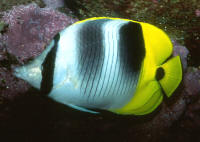
|
| Chaetodon unimaculatus
Bloch 1787, the Teardrop Butterflyfish. Often, too often imported
from Indonesia, the Philippines and even Hawai'i... like the
similar Indian Ocean species of the same common name this is an
"iffy" fish that mainly perishes due to the rigors of
human (mis)handling. Shown: at right: Juveniles of two and three
inches in Hawaii and the Cooks. |
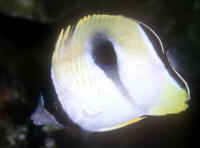 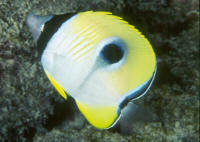
|
| Chaetodon vagabundus
Linnaeus 1758, the Vagabond, Crisscross
Butterflyfish. In the wild feeds on anemones, coral polyps, worms
and algae. Compared with the similar Indian (Ocean) B/F (see
above), Chaetodon decussatus, this species does poorly in
captivity. In the Andaman Sea, and
one in Fiji in the South Pacific |
 
|
| Chaetodon xanthurus
Bleeker 1857, the Pearlscale or Yellow-Tail (though it's more
orange) Butterflyfish. Tropical western Pacific around the
Philippines and Indonesia to Japan. A generalized feeder on benthic
invertebrates and algae. Note cross-hatch pattern compared with
C. mertensii and the Red Sea's C. paucifasciatus.
Aquarium photo. |

|
Genus Chelmon
|
Chelmon rostratus (Linnaeus 1758), the
Copperband Butterflyfish or Beaked Coralfish. Most die within a
week or two of capture from trauma and starvation, dying
"mysteriously" in the night. Due to better conditions
in the age of reef keeping, some folks are able to salvage
specimens, even hand feeding them. From the tropical western
Pacific, to six inches overall length.
|


|
Genus Coradion:
| Coradion altivelis McCulloch 1916, the
Highfin Coralfish. Indo-West Pacific. To six inches in length. This
one off of Heron Island, Australia's GBR. No ocellus and
squarish caudal mark denote this species. |
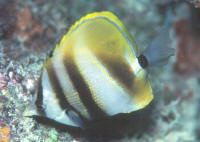
|
| Coradion chrysozonus (Cuvier 1831), the
Goldengirdled Coralfish. Indo-Pacific; Australia, New Guinea,
Indonesia to the Philippines. To six inches in length. Off of Pulau
Redang, Malaysia and N. Sulawesi. An oval black caudal peduncle
marking and single ocellus denote this species. |
 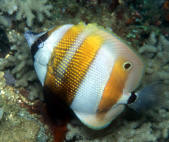
|
| Coradion melanopus (Cuvier 1831), the
Twospot Coralfish. Western Pacific: Indonesia to Papua New Guinea
and Bismarck Archipelago. To 15 cm. in length. N. Sulawesi pix. Not
two ocelli. |

|
Genus Forcipiger: Both members of this genus occur
in Indonesia.
|
Forcipiger flavissimus Jordan &
McGregor 1898, Yellow Longnose Butterflyfish, Forcepsfish. Wide
variety of foods taken, rarely corals. Widest distribution of
B/Fs, from east coast of Africa to west coast of Central America.
To eight inches overall length. Hawaii and Maldives
photos.
|
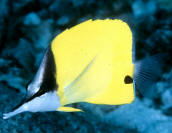 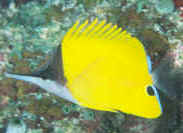
|
|
Forcipiger longirostris (Broussonet 1782),
Yellow Longnose, Long Longnose Butterflyfish. With a longer snout
than its congener and patch of dark spots on the chest to
distinguish the two. Also hardy and about the same size. From
east African coast to mid-Pacific. Dark color forms seasonally
seen. Bunaken, Indonesia and Hawai'i pix.
|
 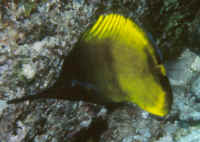
|
Genus Hemitaurichthys:
| Hemitaurichthys polylepis
(Bleeker 1857), the Pyramid (often sold as H. zoster) Butterflyfish.
Zooplanktivore, living in midwater and feeding in shoals. Central
and western Pacific, including Hawaiian Islands. To seven inches in
length. Aquarium and Fiji images. |
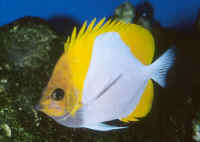 
|
| Hemitaurichthys zoster
(Bennett 1831), the Black Pyramid or Zoster Butterflyfish. Indian
Ocean from Andaman Sea to Africa. Zooplanktivorous, feeding in
aggregations in midwater. Here in captivity and the Andaman
Sea. |
 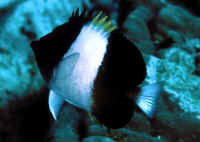
|
Genus Heniochus:
| Heniochus
acuminatus (Linnaeus 1758), the Long-Fin Bannerfish, or
"Poor Man's Moorish Idol". (1) Widespread, central
Pacific to east coast of Africa. Not in Hawai'i. To ten inches
overall length. Cleaners as juveniles. Andaman Sea and Mabul,
Malaysia images. |

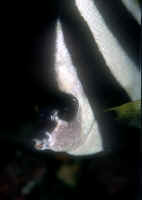
|
| Heniochus chrysostomus
Cuvier 1831, Pennant Butterflyfish.(1) Central to western Pacific
distribution. To six inches long in wild. Similar to H.
varius, which is much more commonly offered in the trade. One
in Australian waters, another in Fiji, a third in N.
Sulawesi. |
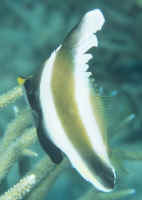 
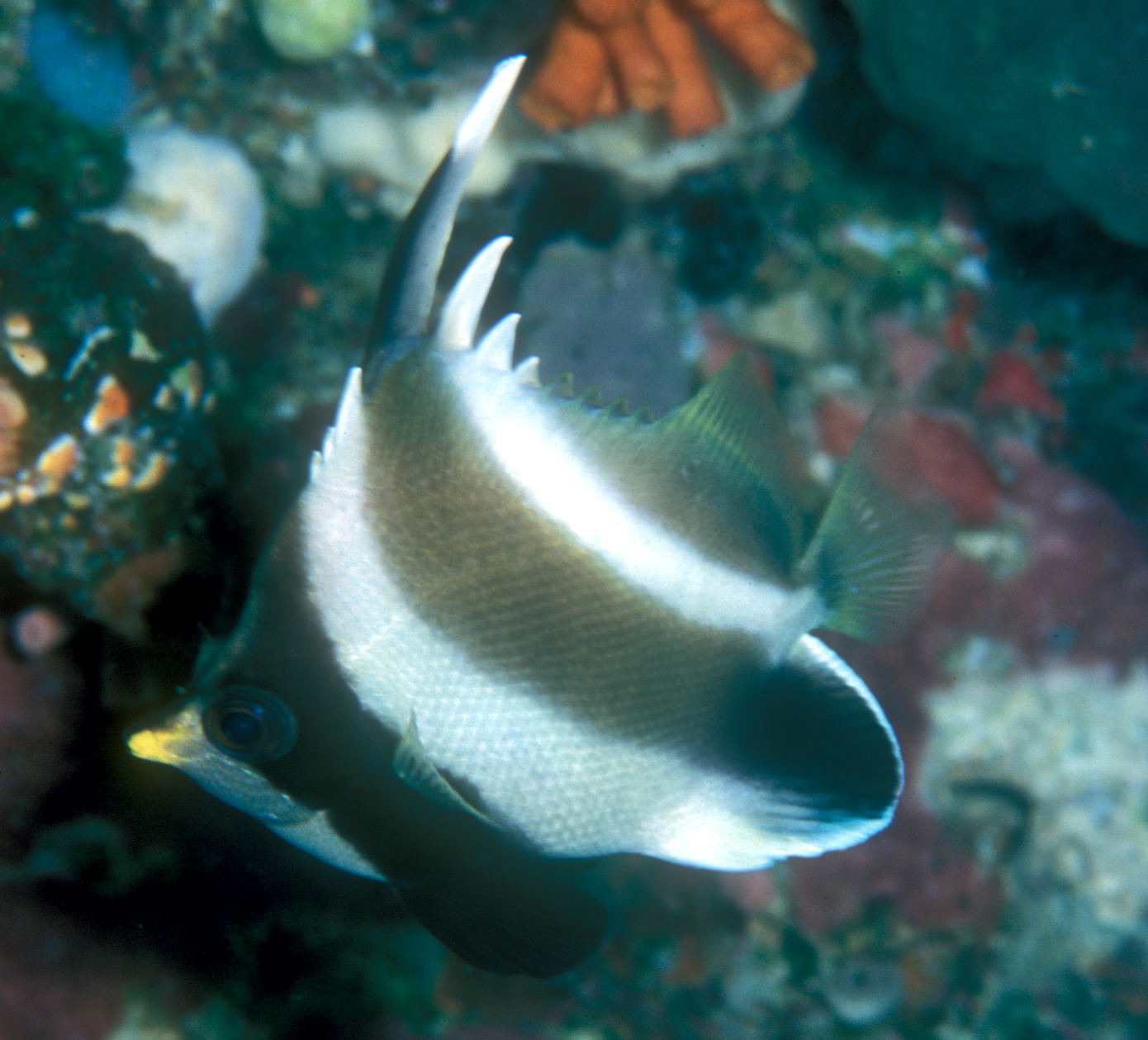
|
| Heniochus diphreutes Jordan 1903, Schooling
Bannerfish.(1) Similar to the "common Heni", H.
acuminatus, but with smaller mouth and more rounded breast
area. Zooplanktivore that excels in a large, un-crowded system.
Cleaners as juveniles. This one in Gili Air, Lombok,
Indonesia. |
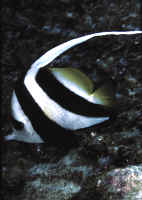
|
| Heniochus monoceros Cuvier 1831,
the Masked Bannerfish.(2). To nine inches long, and
"beefy" in profile. Mid-Pacific to east African coast.
Takes all foods with gusto. |
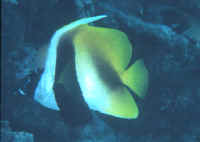
|
| Heniochus pleurotaenia, Ahl
1923, the Phantom Bannerfish.(2) The two horn-like projections on
this species head are definitive. To six inches overall length.
Shy, needs plenty of hiding places to feel comfortable in
captivity. Northerly coasts, islands of the Indian Ocean. This
young individual in the Maldives. |

|
|
Heniochus singularius Smith & Radcliffe 1911, the
Singular Bannerfish. (2) Similar to H. monoceros, but
easily identified by its black mid-body band starting in front,
versus behind the dorsal fin. Indo-west and central Pacific.
|
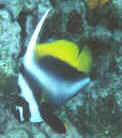
|
| Heniochus varius (Cuvier
1829), Humphead Bannerfish.(2) Western and central Pacific;
commonly shipped out of the Philippines and Indonesia. Does eat
coral polyps in the wild. This one off of Gili Air, Lombok,
Indonesia. |

|
 |
Butterflyfishes for Marine
Aquariums
Diversity, Selection & Care
New eBook on Amazon: Available
here
New Print Book on Create Space: Available
here
by Robert (Bob) Fenner |
|
|

